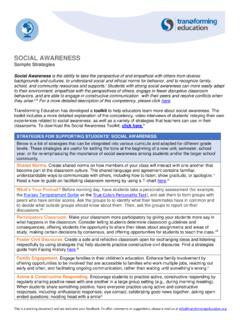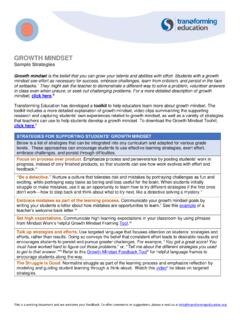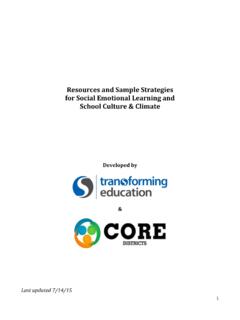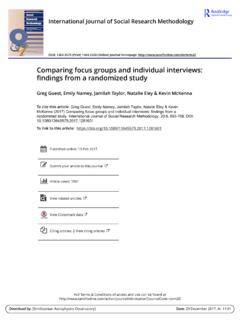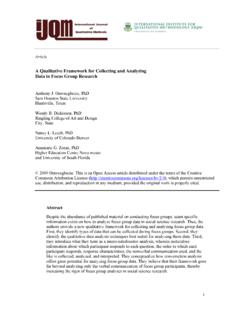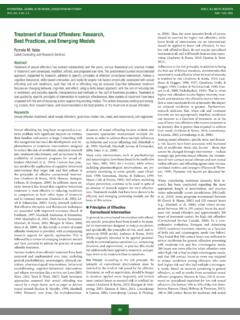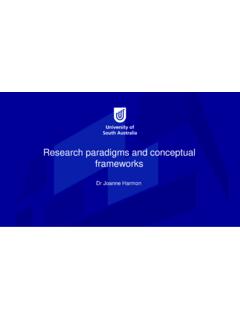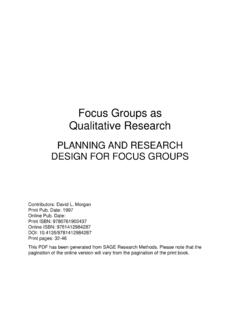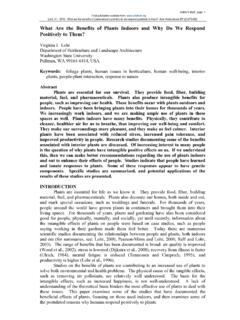Transcription of Mindfulness in the Classroom: Learning from a School …
1 Mindfulness in the classroom : Learning from a School -based Mindfulness Intervention through the Boston Charter research CollaborativeAKIRA S. GUTIERREZ & SARA B. KRACHMANTRANSFORMING EDUCATIONETHAN SCHERER & MARTIN R. WESTHARVARD UNIVERSITY CENTER FOR EDUCATION POLICY RESEARCHJOHN D. E. GABRIELIMASSACHUSETTS INSTITUTE OF TECHNOLOGYJANUARY 2019 Mindfulness in the classroom 2 AcknowledgementsWe would like to acknowledge our colleagues who offered their expertise, thoughts, and feedback on this paper:Jersey Cosantino, TeacherFiona Jensen, Calmer Choice Katie Medlar, Calmer Choice Janice Houlihan, Inner ExplorerTransforming Education would also like to thank the researchers at the Center for Education Policy research at Harvard University and the Massachusetts Institute of Technology, School leaders, educators, and other colleagues for their partnership in the Boston Charter research Collaborative. We thank the members of our National Advisory Board for their extensive contributions to our collective knowledge about the skills that affect student outcomes in School and beyond.
2 We also thank the Walton Family Foundation for their support of the Boston Charter research Collaborative. Note that the views expressed in this paper do not necessarily reflect those of the Walton Family Foundation or the members of our National Advisory Board. Any errors in fact and interpretation are our Education is interested in understanding a variety of programs and practices that support students in building the mindsets and skills they need to thrive. In this pursuit, we share information about emerging research , promising practices, and existing, available resources; however, we do not endorse specific programs, providers, or views expressed in linked resources. About Our Working PapersTransforming Education is pleased to issue a series of working papers that are meant to distill information of value to educators, policymakers, and others in the field of social-emotional Learning (SEL) in a form that can be readily updated as knowledge continues to emerge and be refined.
3 Our working papers summarize the current state of knowledge and evidence about which skills matter for success in School , college, career, and life; how we can responsibly measure and build those skills; and which supports are needed for districts and schools to implement best practices. Because the SEL field is constantly evolving, we expect to revise our working papers periodically. Moreover, we hope educators, researchers, and policymakers will share additional research and effective practices related to social-emotional you have feedback or want to share your own approach to Mindfulness in your district or School , please e-mail supports the free and open sharing of best practices to drive strong student outcomes. We ask our partners to cite our work and to share the original links to our website when in the classroom 3 Table of ContentsExecutive Summary ..Introduction .. Studying Mindfulness in the Boston Charter research Collaborative.
4 Conclusion ..Recommendations for Integrating Mindfulness in the classroom .. Mindfulness Resoures to Explore ..45691012 Mindfulness in the classroom 4 Mindfulness -based practices have been promoted as a promising way to reduce stress and anxiety in students and improve their academic and behavioral outcomes. Using surveys administered to middle School students attending schools participating in the Boston Charter research Collaborative, we learned that greater self-reported Mindfulness correlates significantly with better academic achievement and behavioral outcomes. These results encouraged us to further assess if a School -based Mindfulness intervention could improve students sustained attention, and therefore, their implemented a randomized controlled trial with 6th grade students at a partner School to study the impact of a School -based Mindfulness intervention on students sustained attention and perceived levels of stress.
5 Students either participated in the Mindfulness intervention or a coding training as part of the study. Students assigned to participate in the Mindfulness intervention received eight weeks of Mindfulness instruction, while a control group of students received training in computer coding. About half of the study participants also participated in brain imaging before and after the eight-week program. We found that students assigned to the Mindfulness intervention condition showed a reduction in perceived stress and modest but significant improvements in sustained attention. These students also showed a reduced response of the amygdala, a brain structure associated with emotion and stress, to negative stimuli. Together, these findings suggest the potential value of Mindfulness interventions for alleviating stress and enhancing sustained paper reviews the findings from this study, in addition to other literature on the role, function, and helpfulness of Mindfulness in education.
6 Further research is needed to understand whether regular practice of Mindfulness in the classroom could produce sustained improvements in academic and behavioral outcomes. We conclude the report with some recommendations and considerations for bringing Mindfulness practices into the SUMMARYM indfulness in the classroom : Learning from a School -based Mindfulness Intervention through the Boston Charter research Collaborative TransformEd supports the free and open sharing of best practices to drive strong student outcomes. We ask our partners to cite our work and to share the original links to our website when in the classroom 5 IntroductionMindfulness is defined as increased, purposeful, nonjudgmental attention to the present moment."1 Mindfulness training has been used in the medical field to reduce stress and anxiety and has become increasingly popular with large companies and organizations, including Google and the United States ,3 More recently, Mindfulness -based strategies have been promoted as a helpful tool for educators seeking to improve students educational experiences and cognitive and social-emotional development, which can lead to better academic Schools across the country are embracing Mindfulness -based interventions (MBIs)
7 , and some studies find that teachers report students are more caring and focused after a few weeks of practicing ,6 However, questions remain about the efficacy of such efforts due to inconsistency of results across studies and the paucity of studies with strong research In many schools, Mindfulness practices are used to address students anxiety and depression, as well as to help them build coping skills and positive mindsets. For example, educators in schools such as Conway Elementary School in New Hampshire have been implementing a variety of Mindfulness -related strategies, such as stretching and breathing exercises, to help all students process their Like many schools, Conway Elementary sees the practice of Mindfulness as part of a larger vision for prioritizing students social-emotional Learning . Current understanding about how Mindfulness supports studentsCurrent studies suggest that students participating in Mindfulness programs show small but significant improvements in cognitive skills and in social and Mindfulness in the classroom : Learning from a School -based Mindfulness Intervention through the Boston Charter research Collaborative Self-control refers to the skills involved in planning, controlling, directing, and sustaining one s attention, emotions, and behavior.
8 These abilities are positively related to reading, math, and linguistic abilities, [..] as well as the ability to process social situations more accurately. Consequently, School -based programs which promote self-control may be particularly promising in boosting academic performance and social Bauer, et al., 2018 Mindfulness in the classroom 6emotional behaviors that are positively related to academic MBIs have also been associated with gains in vocabulary and reading performance in several elementary grades, and, in limited cases, in grades Additionally, research suggests that Mindfulness practices may be one way to foster self-control, or the ability to plan, control, direct, and sustain one s attention, emotions, and ,12 Self-control enables students to regulate their behavioral, emotional, cognitive, and attentional resources so that they can accomplish a Learning goal by facilitating persistent focus , reduced stress, decreased aggressive behavior, improved cognitive performance, and enhanced resilience.
9 Better self-control is linked to improvements in completing tasks and understanding social situations more Greater childhood self-control predicts better educational, health, and financial outcomes in adolescence and Among adults, greater self-control is associated with higher educational attainment, stronger interpersonal skills, and a greater sense of ,16 As preliminary studies of Mindfulness practices have demonstrated promising results in the lab, additional studies have attempted to test if these results can be replicated in the classroom . Initial evidence suggests that classroom Mindfulness interventions can reduce stress, decrease aggressive behavior, improve cognitive performance, and enhance resilience in Mindfulness is thought to help with stress by increasing one s capacity to monitor experience, specifically by controlling attention and by practicing empathetic acceptance of emotions. By accepting experiences and feelings with curiosity, kindness, and awareness, students can work through those feelings more quickly by allowing the opportunity to pause and gain perspective on what is happening.
10 In one recent randomized controlled trial (RCT), middle School children predominantly African American students from a low-income background self-reported improvements in mood and coping skills, as well as decreases in rumination after receiving a classroom -adapted Mindfulness -based Another program involving Mindfulness found significant improvements in executive function, mental well-being, and prosocial behavior among 4th and 5th However, other RCTs have failed to detect any significant changes in Mindfulness , depression, coping, and emotional awareness measures in children. Therefore, existing research provides only a limited understanding of the impact of Mindfulness practices on Pre-K-12 students. This is, in part, due to a lack of valid, developmentally-appropriate measures that enable students to accurately report on their self-awareness, which is necessary in order to detect changes in Mindfulness . Furthermore, current measures can be especially challenging for younger children, since their self-awareness and thus, their ability to provide accurate self-reports is typically less developed.
